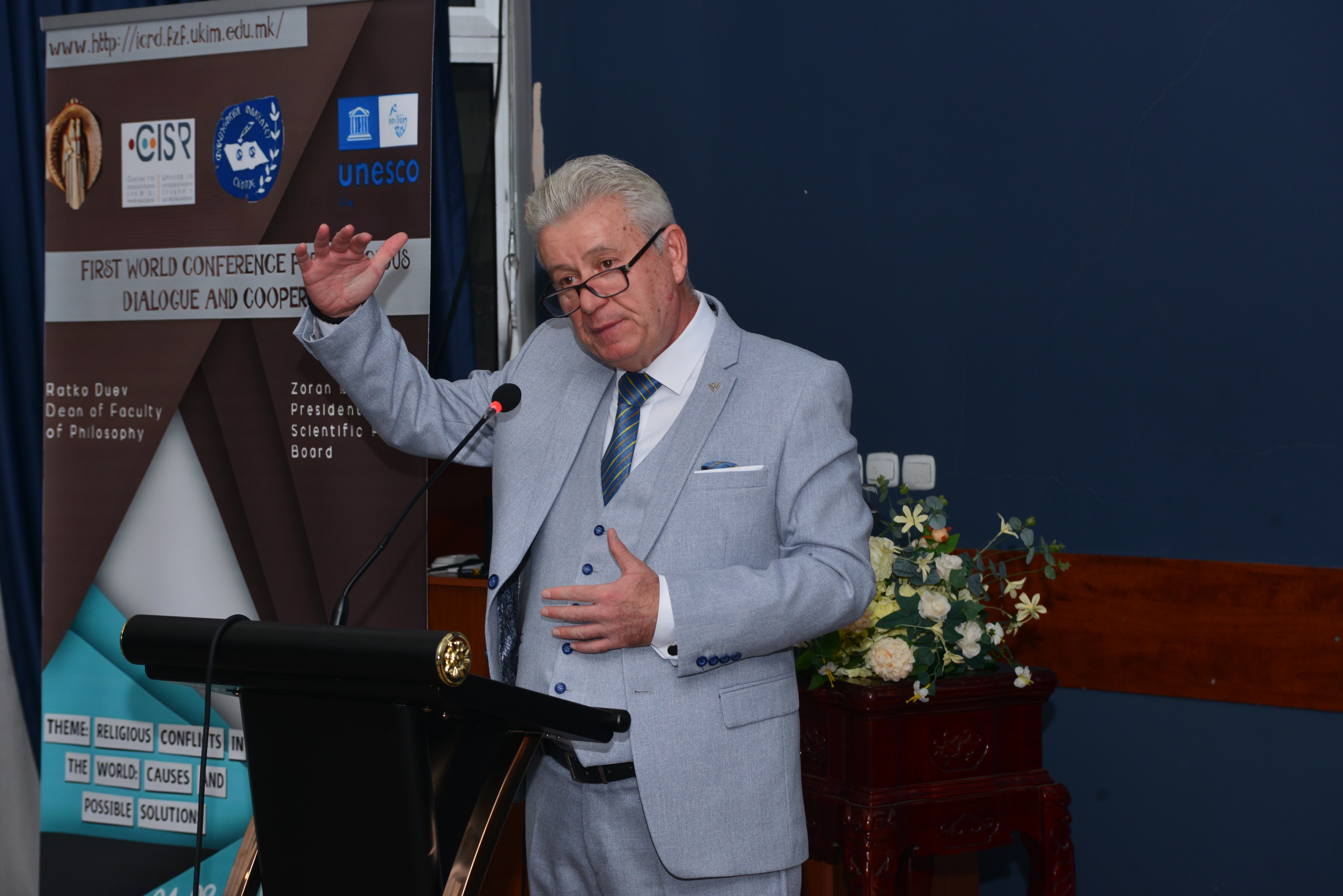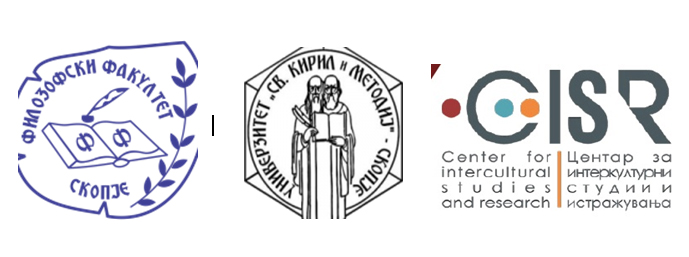4th World Conference for Religious Dialogue and Cooperation
June 22-26. 2026, Skopje, North Macedonia (Complex Macedonian Village)
International Conference for Religious Dialogue and Cooperation

June 22-26. 2026, Skopje, North Macedonia (Complex Macedonian Village)

Following the exceptional success from a scientific and organizational perspective achieved at the First and Second European Conference for Religious Dialogue and Cooperation, as well as at the First, Second and Third World Conference for Religious Dialogue and Cooperation (under the auspices of the Ministry of Culture and Tourism), the Center for Intercultural Studies and Research at the Faculty of Philosophy in Skopje organize the Fourth World Conference for Religious Dialogue and Cooperation on the topic: Religion as a Weapon of War: in the past, present and future (under the auspices of the Ministry of Culture and Tourism). At the Conference, we will bring together eminent and talented professors and researchers with expertise in religious studies, sociology of religion, sociology of culture, theology, philosophy of religion, history of religion, psychology of religion, anthropology of religion and other scientific fields, to present the results of research projects that have a great impact in scientific circles around the world. We will enable the exchange of knowledge with religious dignitaries from around the world to present their views in the interdisciplinary, interfaith debate on the connection between religion and war. Also, we will promote the innovative use of digital tools and new technologies to maximize the impact of research and we will involve the general public, policymakers and religious communities in finding solutions to these challenges.
The causes of religious wars are often complex. Tensions over power, prestige, and territory are key. Economic imbalances and cultural differences also play a major role. When combined with religious intolerance, this creates a combustible mix. This mix can easily lead to violence. External actors often exacerbate the crisis. Great powers may instigate conflict to protect their economic and geostrategic goals. Political manipulation then becomes widespread, and local tensions escalate. Religious intolerance grows in societies where ethnicity is closely linked to religious affiliation. Religion then becomes a tool for mobilizing the masses. Religious fundamentalism turns symbolic differences into a matter of honor and identity. This kind of rhetoric easily transfers from the sermons of church dignitaries to the streets. When public discourse is black and white, the causes of conflict take on an emotional charge. Political manipulation uses fear and myths. For political elites, it is tempting to consolidate power by mobilizing believers. In practice, the most vulnerable categories of the population bear the brunt of the conflict. Propaganda increases the sense of threat. The causes of conflict are presented as “defense of the sacred,” when in fact the battles are fought for influence. Economic interests often determine the terrain of conflict. Control of trade routes and abundant resources are crucial. Money and taxes change, which increases the motivation for conflict. When economic interests intersect with identity, the causes of conflict acquire a stable infrastructure.
Wars in the name of religion leave a deep mark. They change maps, people’s daily habits and power relations. Religious tensions create fear and undermine trust. They suppress the voice of reason. This results in political instability and demographic changes. Mass casualties and forced migrations change population numbers. Estimates speak of millions of victims. Forced migration leaves gaps in the workforce. Ethnic cleansing and displacement break up family lines. This leads to a decline in production and slows economic recovery. The destruction of religious temples and cultural and historical monuments erases cultural memory. This leads to the loss of existing cultures and the creation of new ones. This creates an uneven cultural landscape and long-term political consequences. Confessional division perpetuates instability and supports territorial realignments and security risks. Extremism grows in the cracks of the system. This shapes institutions and power in the long term.
Religious wars today have a new dynamic. Globalization is accelerating the clash of identities. Old power models are being disrupted by new media and migration. Terrorism has become a global threat. It involves political, economic and social causes. In many attacks, religious extremism is a driving force. Local injustices and a sense of inequality are the main motivating forces. Religious wars today are linked to questions of legitimate authority. Conflicts in the Middle East carry the legacy of imperial divisions. Conflicts are taking on a religious dimension. The interests of regional powers and external intervention fuel tensions. The media reinforce the rhetoric of identity. Religious leaders have a great influence in modern societies. They can change the way people think and behave. The combination of faith and power can bring peace or incite conflict. Based on all that has been said above, at the Fourth World Conference on Religious Dialogue and Cooperation we will try to answer the following key questions:
What are religious wars?
What is the difference between religious and secular conflicts?
How did the Crusades shape the concept of “holy war”?
What marked the religious wars during the Reformation?
How does the Ottoman Empire fit into the history of religious conflicts?
Why does religious intolerance encourage religious conflicts?
How do political elites manipulate religion in conflicts?
What is the role of economic factors in religious wars?
What demographic changes do religious wars leave behind?
Can religious conflicts have cultural and intellectual consequences?
How do religious wars affect politics in a country?
How do religious wars manifest themselves in the modern world?
What is the connection between terrorism and religion?
Why is the Middle East often the focus of religious conflicts?
Where in Africa and Asia do religious tensions most often escalate?
How do religious leaders influence religious communities during conflict?
Can religious leaders mediate peace?
Which classical theories help us understand religious conflicts?
What do contemporary, post-secular approaches offer?
Why is the Thirty Years’ War paradigmatic?
How did the Catholic and Protestant wars change Europe?
Were the wars in the former Yugoslavia religious?
How to overcome religious conflicts through dialogue?
Why are religious education and media literacy crucial?
22.06.2026
18.00 Opening of the Conference
18.00 – 19.00 Addresses by representatives of the political, academic and religious elite of R. North Macedonia
19.00 – 19.30 Introductory presentation
19.30 Welcome reception (Macedonian evening)
23.06.2026
08.00 – 09.00 Registration of participants of the Conference
09.00 – 11.00 Working session I (Plenary)
11.30 – 13.30 Working session II (Plenary)
13.30 – 14.30 Lunch
14.30 – 16.30 Working session III (Plenary)
17.00 Visit to the cultural and historical monuments in Skopje (Monastery of Saint Panteleimon in Gorno Nerezi, Marko’s Monastery in Markova Sušica; The Church of the Ascension of Jesus; Museum of the Macedonian Struggle for Independence
24.06.2026
09.00 – 11.00 Working Session IV (Plenary)
11.30 – 13.30 Working session V (Plenary)
14.30 – 16.30 Working session VI (Plenary)
17.00 Visit to the cultural and historical monuments in Skopje (Mustafa Pasha Mosque; Yahya Pasha Mosque; Murat Pasha Mosque; Kursumli An; Old Skopje Bazaar)
20.00 Dinner in a traditional Macedonian restaurant
09.00 – 11.00 Working session VII (Plenary)
11.00 – 11.30 Coffee break
11.30 – 13.30 Working session VIII (Plenary)
13.30 – 14.30 Lunch
14.30 – 16.30 Working session IX (Plenary)
17.00 Visit to the cultural and historical monuments in Tetovo (Painted Mosque Sarena Dzamija; Arabati Baba Tekke; Leshok Monastery; Isa Beg Hammam; St. Nikolas Church)
20.00 Gala dinner (Macedonian evening)
26.06.2026 Departure of the participants of the Conference
Submission of paper proposals (abstracts): April 15, 2026
The final date of the registration for the Conference: May 15, 2026
Final program: June 10, 2026
Submission of full papers: October 1, 2026
Regular Participants: 220 EUR
Participants from high income countries: 320 EUR
(Canada, Hong Kong, Kuwait, Luxembourg, New Zealand,
Oman, Saudi Arabia, Singapore, United Arab Emirates, United
Kingdom, United States)
PhD Students Participants: 150 EUR
On-line participants: 120 EUR
For persons accompanying the participants of the
Conference: 120 EUR
Registration fee includes:
Conference printed materials (program, book of abstracts, certificates for participation in the Conference)
Publication of the final papers in the Journal: Religious Dialogue and Cooperation https://journals.ukim.mk/index.php/rdc/mk/index
Participation in Opening Ceremony of the Conference and welcome reception cocktail (22.06.2025)
Participation in working sessions with coffee breaks
Visit to the cultural and historical monuments in Skopje (Monastery of Saint Panteleimon in Gorno Nerezi, Marko’s Monastery in Markova Sušica; The
Church of the Ascension of Jesus; Museum of the Macedonian Struggle for Independence and dinner in a traditional Macedonian restaurant (23.06.2026)
Visit to the cultural and historical monuments in Skopje (Mustafa Pasha Mosque; Yahya Pasha Mosque; Murat Pasha
Mosque; Kursumli An; Old Skopje Bazaar and dinner in a traditional Macedonian restaurant (24.06.2026)
Visit to the cultural and historical monuments in Tetovo (Painted Mosque; Arabati Baba
Tekke; Leshok Monastery; Isa Beg Hammam; St. Nikolas Church) and gala dinner
The cost of travel and accommodation is not included in the conference fee
Registration fee is paid to the account of the Hotel
(complex Macedonian Village), where the Conference venue is located
For the method of payment of the registration fee, write to: makedonskoseloskopje@gmail.com
For the participants of the Conference, Hotel Makedonsko selo (https://makedonskoselo.com/) offers reduced prices for accommodation with included meals.
HB (breakfast and lunch): 70 euros per person per day in a single room
If you are interested in accommodation in double rooms, the price will be determined in agreement with the hotel
For the method of reservation and payment of the hotel accommodation, write to: makedonskoseloskopje@gmail.com
You can make a reservation at the following address: makedonskoseloskopje@gmail.com

